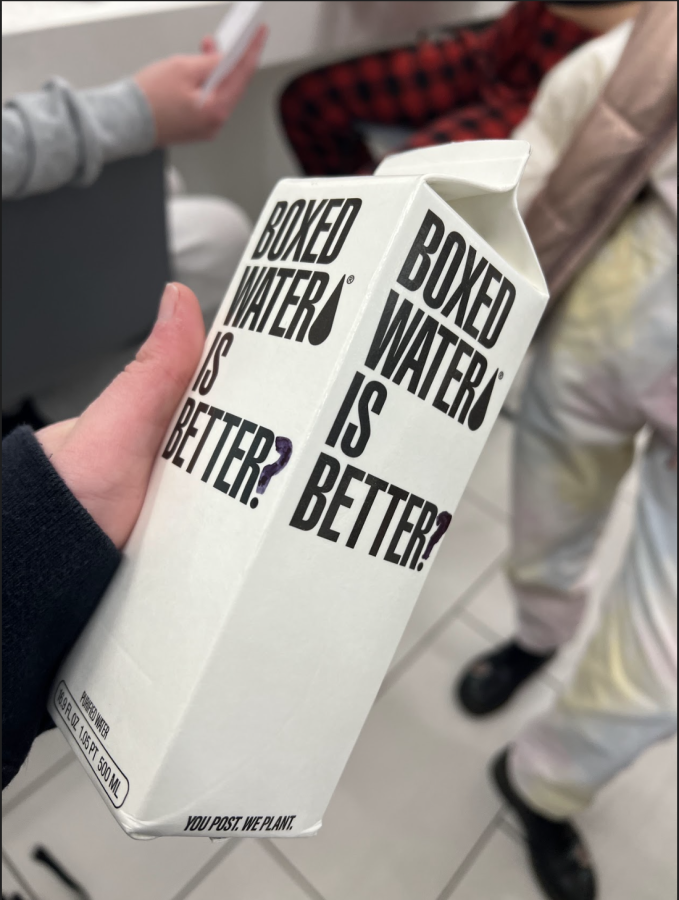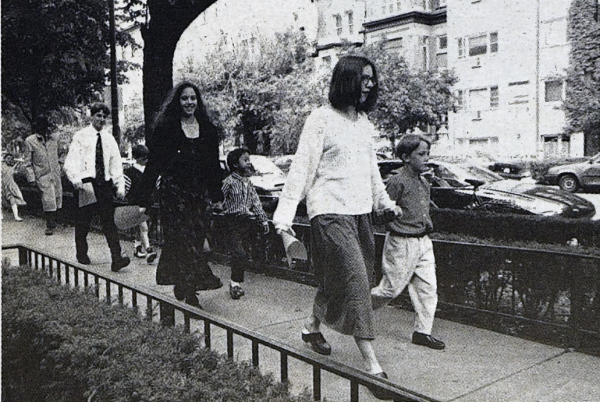Boxed Water Is Better?
Boxed Water is Better, a cartoned water product, has replaced Open Water at Latin’s Kiosk.
Boxed water has replaced aluminum cans as the Kiosk’s water option for students, a move that has created quite the controversy. No one seems to agree whether the water tastes like cardboard, and the product’s bold steps at environmental protection have the potential to create a dialogue about broader environmental choices.
For those wondering why the switch was made from Open Water—Latin’s previous water option—to boxed water, the answer is relatively simple. Latin Handcut Foods representative Michelle Shanks said, “Our vendor for the Open Water was having a really difficult time fulfilling our orders. Since plastic is horrible for the environment, we opted for another somewhat environmentally friendly option which we could order from an alternative vendor.”
The switch has generated its fair share of student opinions, but the main complaint about the water is its taste. Freshman Beth Rosenow said, “I think boxed water might have good intentions because it’s supposed to be better for the planet, but it ends up just tasting like gross aluminum and ends up ruining my water and my day.” The metallic taste of the water is likely because the cartons are 5 percent aluminum. The remainder of the box is composed of plant-based plastic and—mainly—paper.
“I think the cans had more of that classic water taste,” sophomore Ellie Anderson said. “I’m totally supportive of recyclable materials, but I think in order for it to work, the consumer acceptance is really important, too.”
But the taste of boxed water isn’t a one-sided coin; many students enjoy the drink’s flavor. Freshman Ellie Falk said, “I love boxed water. It’s my favorite water ever.”
More broadly, the taste is far from the only factor that makes boxed water notable; the switch has also raised discussions on the environmental effects of various water apparatuses.
Aluminum cans, like the Open Water that Latin used to have at the Kiosk, are far from innocent from an environmental standpoint. While cans can be recycled and turned into new metal cans, the byproducts of aluminum production create toxic runoff that can be harmful to humans, potentially causing respiratory and cardiovascular issues.
Disposable plastic bottles also quite famously have many negative effects on the environment. Upper School biology teacher Amy Merrell said, “We know plastic doesn’t degrade, and so having an influx of plastic in the environment in any form, whether it’s plastic bottles or a pen, is not ideal.”
Furthermore, as plastic bottles break down, they turn into microplastics that can leach toxins and find their way into waterways and wildlife. When not disposed of properly, the bottles can end up in the ocean, where it’s estimated there could be more plastic than fish by 2050. Additionally, most plastic bottles are made using fossil fuels, meaning that manufacturing them can contribute to the progression of global warming.
However, bottled and canned water aren’t inherently evil—the negatives of these products just mean that being thoughtful about when to use disposable water containers is essential. “Using a plastic water bottle in and of itself isn’t terrible,” Ms. Merrell said. “It’s the fact that we use so many of them. Driving a car isn’t terrible—it’s the fact that we drive everywhere and use gas.”
And yet, in the interest of a less destructive disposable water container, boxed water has a compelling selling point: Its manufacturing process uses less fossil fuels and has a lower carbon footprint than bottled water, and the box is made from 100 percent recyclable materials.
That being said, though the boxes help reduce negative environmental effects and can be recycled, Latin students don’t find them easy to reuse. “I think the idea of reusing the box is a lot more difficult than the cans,” Ellie Anderson said. “I found with my peers that we would all reuse the cans, whereas I don’t think I’ve really witnessed anyone actually reusing the box.”
On the subject of reusing water bottles, many students are quick to point out that the most environmentally friendly way to drink water is in a reusable water bottle, and moreover, that many other single-use products have similar reusable counterparts.
As Ms. Merrell put it, “It’s [important to be] thoughtful about do you actually need this water? Do you actually need to get a to-go container? And do you actually need to buy that extra piece of clothing? What is necessity and what is a want?” When it comes to careful consumption of resources, that distinction can be exceedingly important.
In a world of an ever-increasing number of choices, being mindful of how we consume resources as individuals and as a school is as important as ever. As Boxed Water is Better put it, “Please use tap water whenever possible. And when you can’t, reach for our 92 percent plant-based box.”

Scarlet Gitelson (‘26) is delighted to be serving as one of this year’s Editors-in-Chief. Using her writing, she seeks to promote connection and discourse...




















































